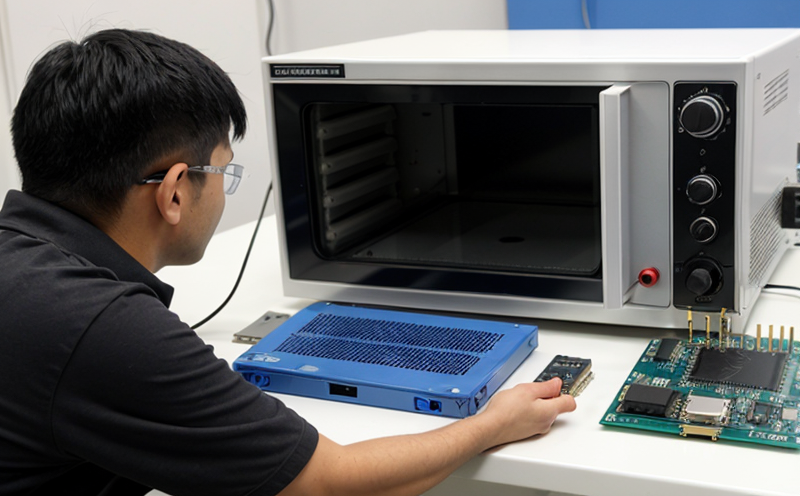UL 746B Polymer Materials Testing for Electronic Components
The UL 746B standard is a critical benchmark in the electronics industry, focusing on the flammability and thermal stability of polymer materials used in electronic components. This test ensures that these materials meet stringent safety requirements to prevent fire hazards in consumer and industrial applications.
Complying with UL 746B involves subjecting the polymer samples to a series of rigorous tests designed to evaluate their flammability behavior under controlled conditions. The testing process is meticulous, involving both horizontal and vertical flame tests along with heat resistance evaluations. These tests are essential for ensuring that materials used in electronic devices do not ignite easily or spread fire rapidly when exposed to flames.
The UL 746B test method specifies a series of steps designed to assess the flammability characteristics of polymer materials, including their ignition temperature, heat deflection temperature (HDT), and limiting oxygen index (LOI). These parameters are crucial for determining how well the material can withstand high temperatures without igniting or sustaining combustion once removed from an open flame. The test also evaluates the char formation and residue after exposure to flames.
For accurate testing, specimens must be prepared with a uniform thickness and size as per UL 746B guidelines. This ensures consistent results across different samples. The testing apparatus includes a horizontal burner for the H125 flame test and a vertical burner for the VTM-1 (Vertical Test Method). During the tests, the material is exposed to specific temperature and time conditions, after which its behavior is carefully observed.
The UL 746B standard also mandates the use of standardized test chambers and equipment, ensuring that all labs adhere to uniform standards. This consistency is vital for comparing results across different laboratories and ensuring compliance with international safety regulations.
Understanding the importance of UL 746B testing is crucial for quality managers, compliance officers, R&D engineers, and procurement specialists who are responsible for selecting materials that meet stringent safety requirements. By adhering to these tests, manufacturers can ensure their products are safe, reliable, and compliant with industry standards.
- Horizontal Burner: Used in the H125 flame test to evaluate ignition temperature and heat deflection characteristics.
- Vertical Burner: Used in VTM-1 tests for assessing flame spread behavior vertically.
- Standardized Test Chambers: Ensure consistent environmental conditions during testing.
Eurolab Advantages
Eurolab stands out in the field of UL 746B polymer materials testing for electronic components, offering unparalleled expertise and advanced facilities. Our team of experienced engineers and scientists ensures that all tests are conducted with precision and accuracy, providing reliable and accurate results.
We leverage state-of-the-art equipment to meet the stringent requirements set by UL 746B, ensuring consistent and repeatable test results. This is crucial for maintaining quality control in manufacturing processes. Our facilities are equipped with the latest testing instruments, allowing us to simulate real-world conditions accurately.
Eurolab’s commitment to excellence extends beyond just conducting tests; we also offer comprehensive consultation services to help our clients understand the implications of their test results and how they can improve their products or processes. Our team is dedicated to providing personalized support to ensure that our clients are fully informed about compliance requirements.
By choosing Eurolab for your UL 746B testing needs, you gain access to a network of industry experts who can provide valuable insights and guidance throughout the entire testing process. We pride ourselves on delivering not just results but also actionable recommendations that help drive innovation and ensure safety in electronic component manufacturing.
Why Choose This Test
The UL 746B test is indispensable for ensuring the safety of polymer materials used in electronic components. By conducting this test, manufacturers can verify that their materials meet stringent flammability and thermal stability criteria. This not only enhances product safety but also protects consumers from potential hazards associated with non-compliant products.
The test results provide critical data that help companies make informed decisions about material selection and design modifications. For instance, if a polymer fails the UL 746B test, it indicates that further improvements are needed in its flame retardant properties or heat resistance. Such insights enable manufacturers to refine their processes and materials, leading to safer products.
In addition to enhancing safety, compliance with UL 746B also offers significant business advantages. Meeting this standard is a testament to the quality and reliability of your product, which can enhance brand reputation and customer trust. This can translate into increased market share and competitive advantage in the highly regulated electronics industry.
The test ensures that products comply with international safety regulations, making it easier for manufacturers to export their goods globally. Compliance with UL 746B is a prerequisite for many countries' import regulations, simplifying trade processes and reducing compliance risks.
By choosing this test, you ensure that your products meet the highest standards of safety and reliability, setting a benchmark for quality in the electronics industry. This commitment to excellence not only protects users but also fosters trust and loyalty among consumers and partners.
Environmental and Sustainability Contributions
- Emissions Reduction: By ensuring that polymer materials used in electronic components are flame retardant, the UL 746B test helps prevent fires, which can lead to significant emissions of toxic gases.
- Material Efficiency: The test promotes the use of safer and more efficient materials, reducing waste and promoting recycling practices.
- Eco-Friendly Design: Compliance with UL 746B encourages manufacturers to design products that are both safe and environmentally friendly, contributing to a sustainable future.





